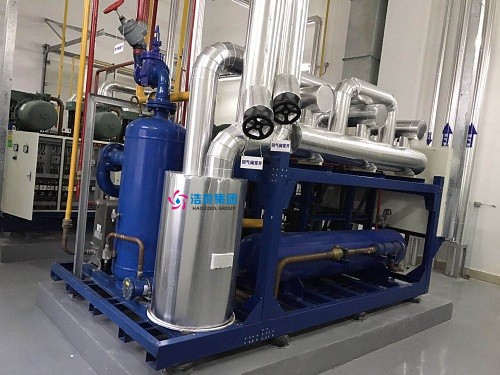1. Project Scope & Capacity Estimate
Building a cold storage facility capable of holding 10,000 tons of fruits and vegetables typically requires a total storage volume of approximately 60,000 cubic meters.
Using standard stacking and space allocation practices (5–6 m³ per ton), such a facility would be classified as ultra-large-scale, with multiple temperature-controlled zones.
- Estimated Cost (in China): RMB ¥7.5–8 million
- Approximate USD Conversion: $1.0–1.1 million USD (depending on exchange rate and equipment level)

German Bitzer refrigeration unit
2. Key Factors Affecting Cold Storage Construction Cost
2.1 Cold Room Configuration
A 60,000 m³ cold storage facility is typically divided into multiple chambers based on function and temperature:
- Cold Rooms: 0~4°C for short-term fresh storage
- Freezer Rooms: -18~-25°C for long-term storage
- Pre-cooling Rooms / Sorting Area
- Blast Freezer Tunnel
- Processing Area (if needed)
- Special Chambers: For pharmaceuticals (GSP-compliant), or explosion-proof zones for chemicals
The layout design should be tailored to the specific usage scenario, which directly influences the cost.
2.2Compressor System
The compressor unit is the core component of the refrigeration system, and greatly impacts performance and pricing.
For a 10,000-ton capacity cold storage, high-efficiency, reliable compressors are essential.
Popular brands include:
- BITZER (Germany)
- Copeland / Emerson (USA)
- Frascold (Italy)
These international brands offer stability and durability, but cost more than local or entry-level equipment.
2.3Warehouse Size & Economy of Scale
Larger cold rooms require more insulation panels, structural work, and piping – resulting in higher total cost.
However, per cubic meter cost tends to decrease as size increases, due to fixed equipment and construction costs being distributed.
Conversely, small cold rooms often have higher unit cost per m³, since essential systems are still needed regardless of scale.
2.4Insulation Materials
Cold storage efficiency depends heavily on insulation performance.
| Material Type | Cost | Performance | Suitability |
|---|---|---|---|
| PU Sandwich Panels | High | Excellent (Low K-value) | Suitable for all temperature zones |
| EPS Panels (Foam) | Low | Weak (Degrades Over Time) | Only for chilled rooms above 0°C |
PU panels (polyurethane) are more expensive but offer superior thermal insulation and long-term savings in energy consumption.

PU Sandwich Panels
2.5 Cooling Temperature & Speed Requirements
Lower temperature requirements or rapid cooling demands require:
- Larger compressor capacity
- Stronger airflow systems
- Faster heat exchange coils
For example, blast freezing tunnels (-35°C) or quick pull-down systems cost more than standard cold rooms.
3. Final Budget Range (For Reference)
| Location | Estimated Cost Range (10,000-ton) |
|---|---|
| Porcelana | RMB ¥7.5M – ¥8M (~USD $1.05M) |
| Southeast Asia | USD $1.3M – $1.5M (depending on labor & materials) |
| Africa / South America | USD $1.6M – $2.0M (with import duties, logistics) |
Note: These are reference figures only. Final cost depends on site conditions, material origin, labor cost, and customization.
 Proveedor de soluciones de almacenamiento en frío de China
Proveedor de soluciones de almacenamiento en frío de China
